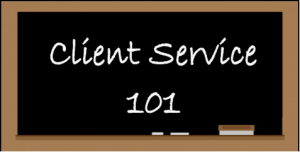Client Service 101
 Building strong client relation skills should begin before your first actual client interview or case assignment.
Building strong client relation skills should begin before your first actual client interview or case assignment.
In fact, it likely started years ago – in kindergarten, or even in your high chair – when you began learning how to deal effectively with the people around you.
The lawyer-client relationship, however, poses unique challenges and opportunities. Following are 10 tips for developing excellent interaction in the law office:
- Start off right. Studies show that first impressions are formed within three minutes. Make those initial one hundred and eighty seconds count. A warm greeting might include a smile, handshake and direct eye contact. Introduce yourself and thank your clients for coming. Address them by name. People like being recognized. Most clients will be nervous in initial interviews. They are likely there out of necessity, not choice. Putting them at ease helps ensure a productive meeting.
- Environment affects attitude. Make the interview room safe, attractive and comfortable. Offer the client a cup of coffee or a bottle of water. Providing the client with something tangible without being asked sets a proper tone of service and responsiveness to their needs. Turn off your cell phone. Give the client your undivided attention.
- Make client service a part of your mission statement. A survey of Fortune 500 businesses found that the primary factor distinguishing good companies from great companies was customer service. Satisfied clients are your best advertising and referral source. They also pay their bills and are more forgiving when mistakes happen.
- Keep it quiet. Clients come into the law office to discuss their most sensitive financial and emotional issues. Confidentiality is key. Assure them that all discussions will be kept strictly confidential. Avoid being judgmental; they have come to you for advice and help, not condemnation. Never discuss one client’s case with another client. Make sure no case files or documents are lying around when a client is in your office. Turn off your computer or move the screen out of eyesight.
- Open your ears. Practice active listening. Often, lawyers are too busy touting themselves or giving half-baked advice to hear what the client is really saying. Let clients tell their stories without interrupting or editorializing. At the end, ask what the client wants. They might not know themselves, or perhaps they simply wanted someone to listen to them. Ask how they think you can help them. Make sure you’re both on the same page. Be empathetic. Try to put yourself in their shoes and see the problem from their perspective. You might find that their idea of a solution is quite different from yours.
- Don’t condescend. Not every client has sterling character and stellar accomplishments. In fact, they might have come to you precisely because they lack both. Treat them with respect and dignity anyway. Marketing wizard David Ogilvy admonishes his employees not to think they are better or smarter than their clients. Such a mindset, he says, will only diminish the firm’s stature. Instead, clients should be considered equally important. That way, he says, we will all become giants.
- Establish clear expectations. Tell the client how long an initial interview will last and whether a fee will be charged. When you’re able to do so, give them at least an estimate of how long their case will take, and what it will cost in fees and expenses. They want to know, whether they ask you or not. Put your representation agreement in writing and review it in detail with your client. Ask how quickly they expect you to respond to their phone calls or emails. It might be that they think a 24 hour response is 23 hours too late.
- Avoid on-the-spot advice. After the first interview you will have heard only one side of the case. If asked for an opinion, it’s okay to say you’ll need to do additional research and investigation before offering one. Under-promise and over-deliver. Avoid making predictions about the case or giving guarantees. False hope at the outset will lead to an unhappy client when reality kicks in. Law management guru Jay Fooonberg suggests keeping written memoranda in the file documenting “Client Expectations” and “Attorney’s Advice.”
- Don’t take it personally. Your goal is to provide a professional service, not make a new friend. Clients want lawyers who are capable and trustworthy. As the poet George MacDonald says, “To be trusted is a greater compliment than to be loved.”
- Say please and thank you. Your mother and kindergarten teacher were right: manners are important.




